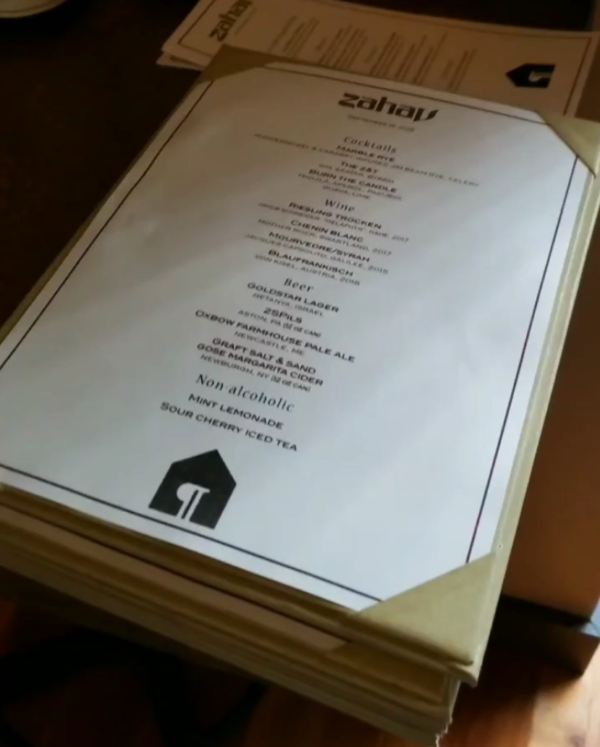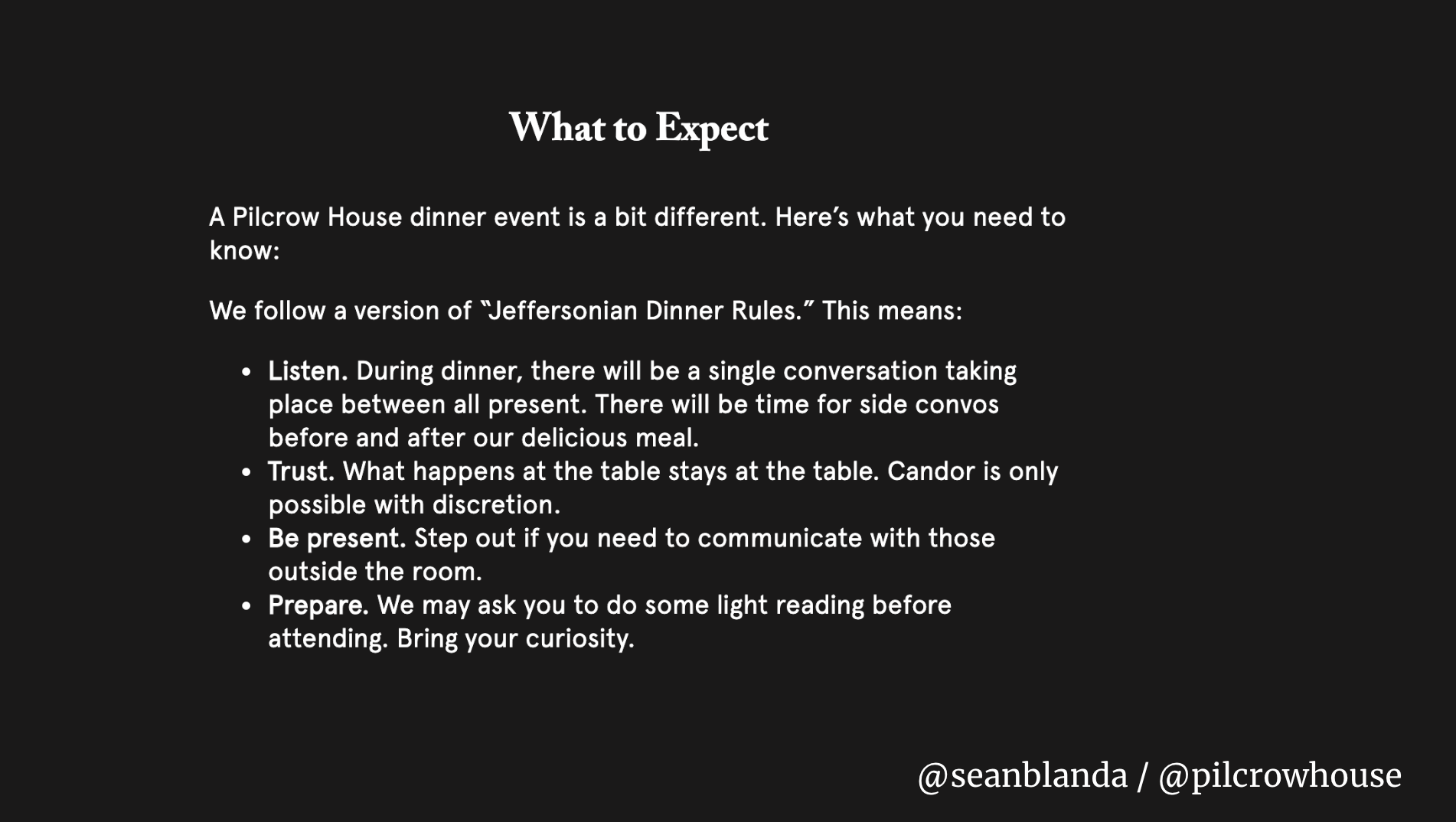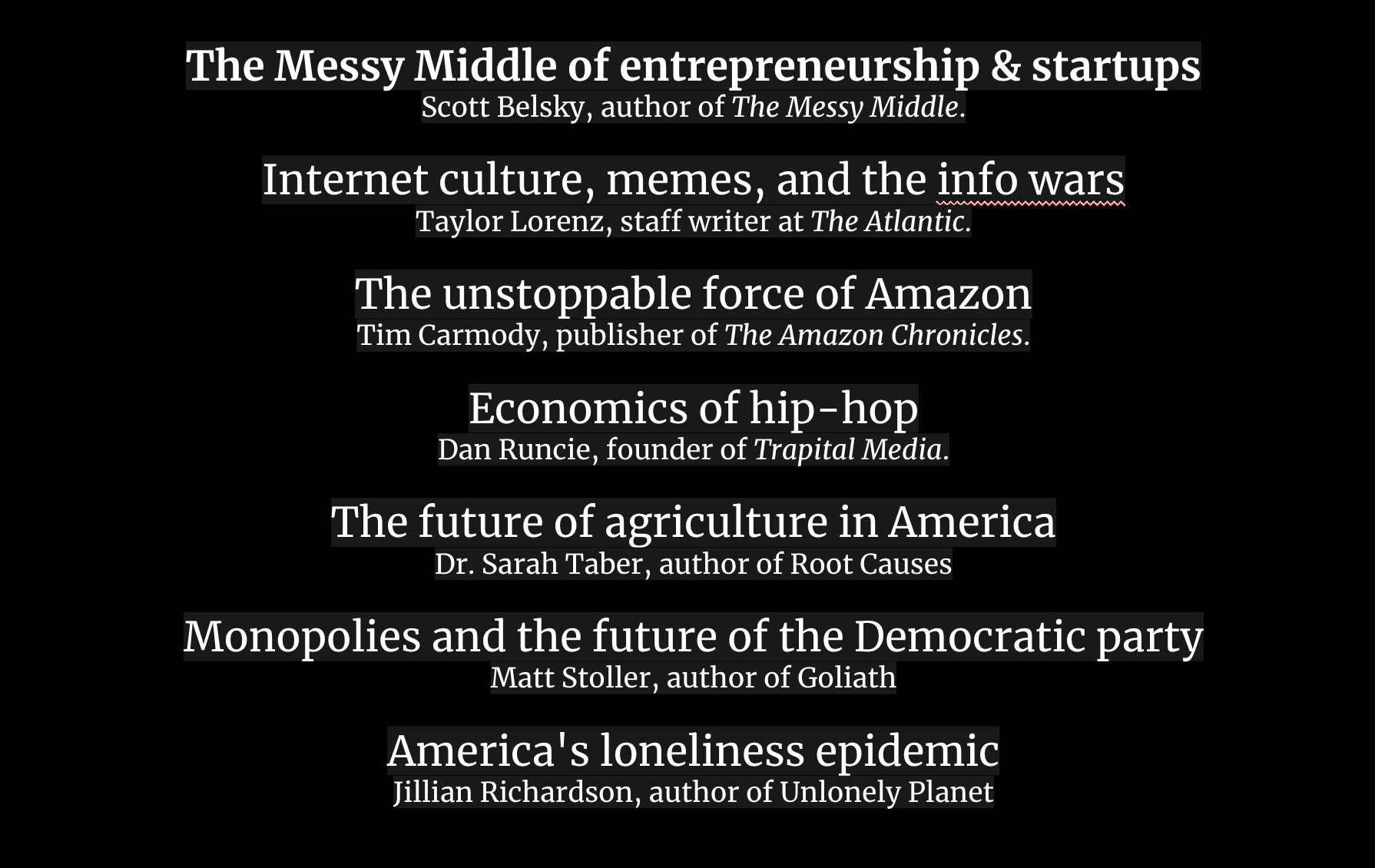It's about the people, stupid: Lessons from 1 year of Pilcrow House

Pilcrow House is an event series that aims to foster candid conversation over some delicious food.
At least, that’s what it is today. A year in, Allison and I are still figuring it out.
Since the first Pilcrow House event with Adobe executive and author Scott Belsky in November 2018, Pilcrow House events have existed with different positioning, event types, and pricing on a quest to build a new Philadelphia institution. One that attracts the ambitious and the curious — while making some of the top authors and intellectuals more accessible to Philadelphia.
Pilcrow is a side project, one we want to build slowly and thoughtfully. As a result, we’ve tried some things and have learned some lessons. I presented these lessons to Klein Camp here in Philadelphia on November 16th, 2019. What follows is a mix of what I presented, and some bonus extra lessons (And be sure to subscribe to the Pilcrow House newsletter for event updates!):
It’s about the people, stupid
One day, we hope that Pilcrow House has a physical location where attendees and community members can gather for intellectually stimulating events and conversation. The ambitious and aggressive thing to do would be to immediately acquire a space, begin programming events and workshops, and then hope the people come.

Failing fast works if your goal is to quickly find the idea that scales the fastest. But that’s not what Pilcrow House is or ever will be. Before all, Pilcrow House needs to be a gathering place. And that doesn’t happen overnight.
Here, I’m thankful for the lessons shared by Indy Hall, Blue Stoop, and others in this city. Both are thriving communities, and both started by getting the community and content right before ever thinking of renting a space. They started by thinking of the people.
Pilcrow House has welcomed CEOs and interns. People from Center City and from two states away. College students and retirees. This season we sold our first “season tickets.” Creating something that lasts isn’t about programming, content, physical space, or even food. It’s about the people.
Events are about expectations
Even the simplest event has a high number of variables. One of the many career lessons I learned from Jocelyn Glei was the importance of setting expectations. Your goal when planning an event is to remove as much uncertainty as possible for all parties. This applies to everyone: the speakers, the guests, the sponsors, and the venue.
Some simple examples:
- Speakers – As a speaker at other events, it can be daunting to have to share ideas with an audience you don’t know, in a space you are not familiar with. As an event host, it is our job to remove any barrier to the speaker feeling at ease. That includes: What the space will look and feel like, what they should wear, exactly when they should show up, what kind of person is expected to attend, will it be recorded?, where will promo appear?, should they come with a full or empty stomach?, what kinds of questions will be asked from guests and hosts?, and much much more.
- Attendees – Will there be food served? What kind? What are your allergies? When is the exact time they will be expected to arrive? When can they leave? What context or info should they read about the speaker to get the most out of the event? Will you be allowed to tweet? Take photos? How will the event feel? What should you expect to get out of the dinner?
- Venue – How many people will be there? What is the seating arrangement? How should the host greet our attendees? Where will they send them? Do they accompany guests to the table? Should they hand them a drink right away? What music are we playing? Is the lighting bright or dim?
- Sponsors – We haven’t had these yet. But if you’re interested, email me!

In each case we try to communicate the expectations in a single email on a new thread, giving each party a single reference (and for venues, a single source of truth for us to reference if something is not quite right when we arrive).
Get the mission and messaging right
I’ve had coffee or drinks with many Pilcrow attendees and eventually, the question is asked, “So, what’s the plan for this thing?” If I’m being honest, we don’t have the best answer. Not yet. But we’re getting there.
We know we want to have a dedicated space. We want to foster candid conversation. We know we want Pilcrow to be of Philadelphia. We know we want to connect our attendees. We want this to feel fun and not contrived. There’s room to improve for us on all of these, for sure, I’ve changed our tagline at least four times.
Pilcrow House speaker #1 Scott Belsky likes to say one should be, “mission-center and medium agnostic.” We’re still exploring the right way to communicate and listen for the right mission and values. That’s part of the fun, but it’s something we need to get right before growing into a space.
Use your assets
When Pilcrow House began we hosted “on-stage” interviews with notable thinkers. While we will return to this structure soon, something about that felt off as the foundational event. It felt expected. As curious people that live in a major city, Pilcrow House attendees could attend an event every night if they wanted. That means we can’t just be the same, but better. We need to be different and better. So we took stock of our assets:
- Location: Philadelphia is smack in the middle of the Northeast corridor, which means anyone on any sort of promotion tour in the eastern timezone will likely pass through (or over) Philadelphia. Advantage: We can piggyback on existing travel to lure top-shelf speakers here for a lower cost.
- Speakers are tired of the same event structure: Many authors and intellectuals are on a “circuit” of lectures, or conference talks to cavernous hotel ballrooms to uncertain audiences of larger brands. They can all blend together and it can feel as if the speaker is performing rather than connecting. I knew from my time organizing other conferences that the speaker dinners were often the speaker’s favorite part. Advantage: Only do the fun part. We’ve been able to attract great speakers by offering something intimate.
- Philadelphia’s restaurant scene. We’re a top five American food city with more restaurants per capita than every other city save Boston. The city is also home to a number of very successful but accessible restaurant groups. Advantage: we’ve begun to develop relationships with local groups to utilize their best private tables and host a truly unique event.
- Scaling: Many events are an extension of another brand and are created for business reasons, rather than community or creative reasons. This is okay and often needed. But sometimes, the event is an extension of a brand rather than being the reason the brand exists. Advantage: Pilcrow, for now, is a labor of love. We can play the long game and explore and be a bit more high-touch.

What’s next?
Our final Pilcrow House dinner of Season Two is Wednesday, December 11th (learn more and snag a reservation here).
After that, Allison and I will begin work on Season Three, which will feature new (and possibly experimental) event types. If you’re interested in attending, learning more, or have feedback/advice, we’d love to hear from you. Drop us a line or subscribe to Pilcrow’s email list to get a heads up when new events are announced.